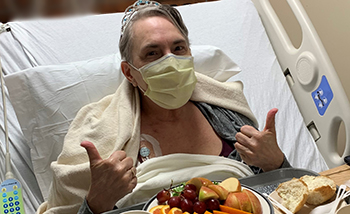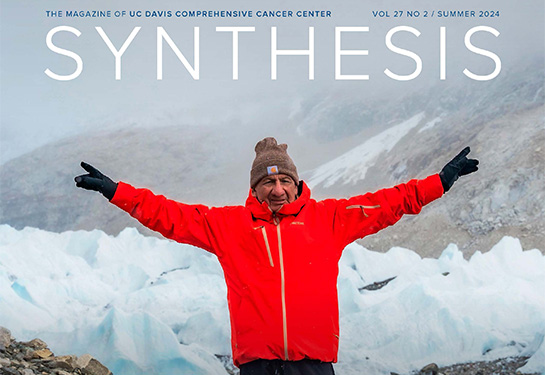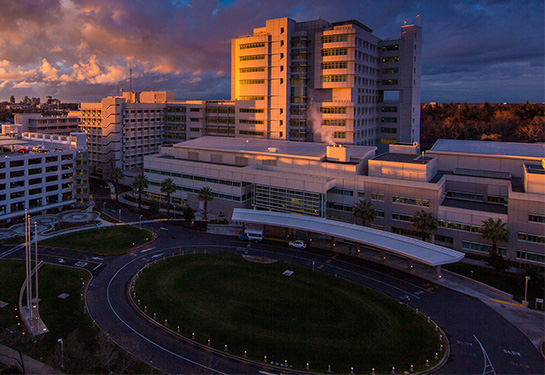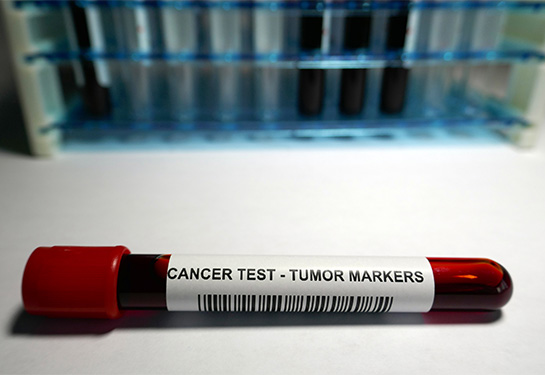Stem cell transplants now available for some on outpatient basis
Lengthy hospital stays are no longer the only option for some stem cell transplant patients. The first UC Davis Comprehensive Cancer Center patient to receive a transplant on an outpatient basis at is back home and in remission.

“I love the fact that I could be part of such a success,” said Benicia resident Dara Karl, the first multiple myeloma patient to receive a stem cell transplant at UC Davis Health without being hospitalized during the procedure.
Many blood cancers are resistant to standard doses of chemotherapy. Studies have shown that high doses of chemotherapy can eradicate many, if not all, cancer cells that are resistant to standard doses of chemotherapy. However, high doses will also damage the bone marrow and stem cells that reside within it. Stem cell transplantation, sometimes referred to as a bone marrow transplant, is a procedure in which a patient receives their own archived stem cells to allow them to recover from the effects of high doses of chemotherapy.
What patients are good candidates for an outpatient stem cell transplant? They need to be receiving an autologous stem cell transplant and fit the following criteria:
• Be in relatively good health.
• Live within an hour drive of the UC Davis Medical Center or willing to stay at a nearby hotel.
• Have a responsible relative or friend who can serve as a support system for the patient 24/7 for at least two weeks.
• Agree to follow infection prevention guidelines (i.e., wear mask, and stick to a strict medication and diet regimen).
• Refrain from allowing pets or young children in the home during the treatment process.
After the stem cells are infused into a patient’s bloodstream, they travel to the bone marrow and begin the process of forming new, healthy blood cells, including white blood cells, red blood cells and platelets.
A month following her stem cell transplant, Dara was told by her oncologist that her cancer was in deep remission. In fact, there was no sign of the cancer at all.
Karl said she doesn’t feel like a pioneer and she says she simply did, “what my doctors told me to do.” The widow and mother of two grown daughters—one a professor in Oklahoma and the other severely disabled with cerebral palsy at home—Karl didn’t want to endure a typical three- week stay in a hospital for the transplant procedure. Her sister, Deb Deans, was by her side through it all as the two relaxed, following the procedure, in the comforts of the Marriott Hotel on the UC Davis Health campus.
“Delicious meals were brought to us by hospital staff and we were able to have some of our own diet-compliant snacks thanks to the room having a kitchenette,” said Karl. “It certainly was a lot better than being in a hospital room, with the sounds of medical equipment and nurses coming in, day and night.”
Karl did have minor complications not related to the outpatient procedure and spent a few days in the hospital toward the end of her two-week recovery, but said she was pleased she was able to spend her initial recovery time in the hotel.
A stem cell transplant may be:
• Autologous (using a patient’s own stem cells that were collected and saved before treatment)
• Allogeneic (using stem cells from a related or unrelated donor)
• Syngeneic (using stem cells donated by an identical twin)
• Cord blood (using umbilical cord blood donated after a baby is born)
UC Davis oncologist Joseph Tuscano performed the two-hour transplant in late April. He said most outpatient stem cell transplant patients will be able to recover at home as long as they live within an hour of the cancer center. If not, hotel accommodations on campus are available.
“Outpatient stem cell transplants offer the full benefits of the standard inpatient version of this lifesaving procedure,” said Tuscano. “But we think there will be a decrease in recovery time and an increase in the mental wellness of patients who can become stressed by long hospitalizations and separation from family.”
Offering outpatient stem cell transplants is even more important during times such as the COVID-19 pandemic, when visitors to the hospital are limited.
“We think being with loved ones is an important part of the recovery process,” said Tuscano. “It also lowers health care costs and allows the patient to get back to enjoying life, which is what it is all about.”
UC Davis Comprehensive Cancer Center
UC Davis Comprehensive Cancer Center is the only National Cancer Institute-designated center serving the Central Valley and inland Northern California, a region of more than 6 million people. Its specialists provide compassionate, comprehensive care for more than 15,000 adults and children every year and access to more than 150 active clinical trials at any given time. Its innovative research program engages more than 225 scientists at UC Davis who work collaboratively to advance discovery of new tools to diagnose and treat cancer. Patients have access to leading-edge care, including immunotherapy and other targeted treatments. Its Office of Community Outreach and Engagement addresses disparities in cancer outcomes across diverse populations, and the cancer center provides comprehensive education and workforce development programs for the next generation of clinicians and scientists. For more information, visit cancer.ucdavis.edu.



